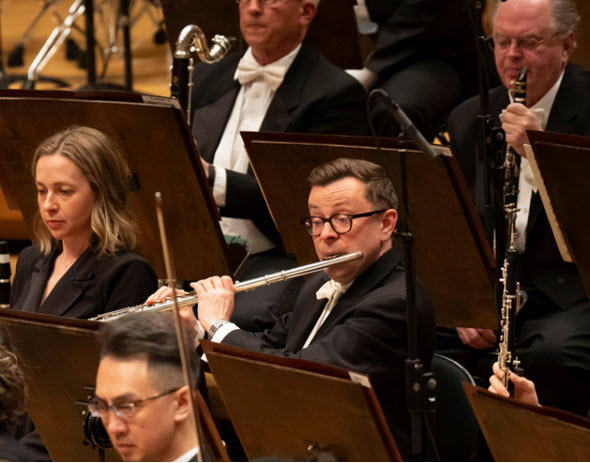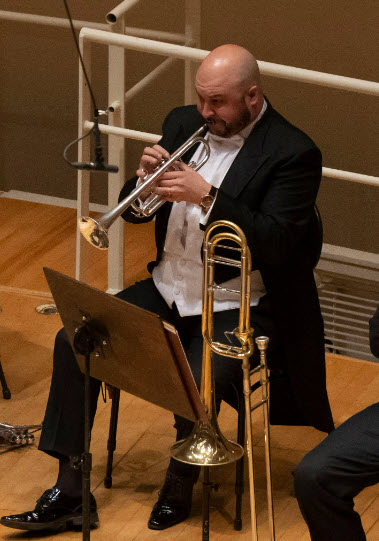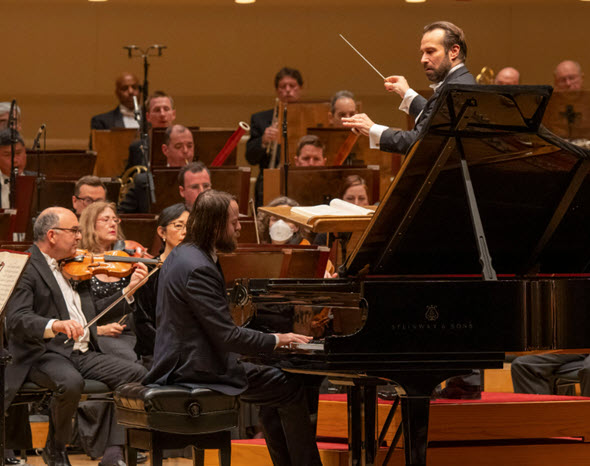French conductor Fabien Gabel, in CSO debut, makes subtly dazzling splash with Stravinsky

Fabien Gabel made an impressive debut leading the Chicago Symphony in Stravinsky’s 1911 ballet ‘Petrouchka.’ (Todd Rosenberg photos)
Review: Chicago Symphony Orchestra conducted by Fabien Gabel; Daniil Trifonov, piano. Repeats at 8 p.m. April 22 and 3 p.m. April 23.
By Lawrence B. Johnson
If many in the audience at Orchestra Hall were unaware of French conductor Fabien Gabel when he made his debut April 20 with the Chicago Symphony Orchestra, they surely will remember him upon his presumably early return. The 47-year-old maestro’s fundamental musical elegance suggested that of CSO music director Riccardo Muti. On this first visit, Gabel’s leadership was fluent and efficient, the musical result as eloquent and nuanced as it was brilliant.

Principal flute Stefán Ragnar Höskuldsson had a starring solo role in Stravinsky’s brilliant ballet.
Gabel set himself quite a challenge with Stravinsky’s 1911 ballet “Petrouchka,” not the often performed suite but the full-length, 34-minute ballet in all its dazzling rhythmic intricacy and wry wit — which Stravinsky took over the top when he reorchestrated the work in 1946. The ballet’s narrative, about a pathetic puppet who fares badly in a love triangle with a Ballerina and a Moor, becomes dispensable in the concert hall, where the riotous music itself — the immediate and indeed prescient forebear to “Le sacre du printemps” (1913) — holds the listener in delighted thrall through every shimmering measure.
“Petrouchka” is tricky business with its jagged rhythms and turn-on-a-dime changes of pace and color as broad lyric swatches suddenly give way to astonishing ensemble acrobatics. The music is also rife with marvelous solos, dispatched here with hair-raising virtuosity by flutist Stefán Ragnar Höskuldsson, clarinetist Stephen Williamson and trumpeter Esteban Batallán. It bears noting that, like Tchaikovsky’s “Pathétique” Symphony, “Petrouchka” ends very quietly, which means even as great a performance as this one can be met by oddly restrained applause. Such was the case here — until Gabel began acknowledging the solo stars. Then the crowd went wild.
Although Gabel turned the pages of a score for “Petrouchka,” I suspect he didn’t need it. The music’s piquant and charming subtleties were manifestly at the tip of his baton from start to finish. Stravinsky’s brash brasses, buzzing strings and bubbly winds were measured and proportioned and contoured with unerring conviction and purpose. This was “Petrouchka” spiced to a fare-thee-well.
Neither to be underestimated was Gabel’s deft conducting as collaborator in Rachmaninoff’s Piano Concerto No. 3 in D minor with soloist Daniil Trifonov, who lit up the hall with an electrifying turn through this monster assignment. Rachmaninoff, a pianistic titan in the tradition of Liszt, wrote the D minor Concerto (1909) with his own phenomenal technical means as his guide. Trifonov delivered what surely would qualify as a performance worthy of the composer: resounding in its power, airborne and effortless in its agility, sweeping in its concept.
Exemplary of Trifonov’s whole approach was the heroic solo episode that occurs in the middle of the opening movement, a sort of cadenza that expands into a veritable rhapsody, as conductor and orchestra join the rest of the house as listeners. Trifonov explored this remarkable interlude with the wizardly singularity of a pianist rare in the world today. Then Gabel edged the orchestra back into the game and off they all continued together. Perhaps the most striking feature of Trifanov’s playing in this particular concerto was his ability to meld power with lightness of touch, a quality that buoyed Rachmaninoff’s lyrical slow movement and invested the concerto’s fearsome conclusion with consummate beauty.
Gabel opened his all-Russian program with a rare miniature, Liadov’s tone poem “Kikimora,” a sumptuously orchestrated, seven-minute evocation of the eponymous character, a female house spirit with an evil streak from Russian folklore. No doubt even modern-day Russians make the connection with Liadov’s lovely score in a way that we cannot, but this little discovery was a treat nonetheless, and Gabel led the CSO in an affectionate performance.



